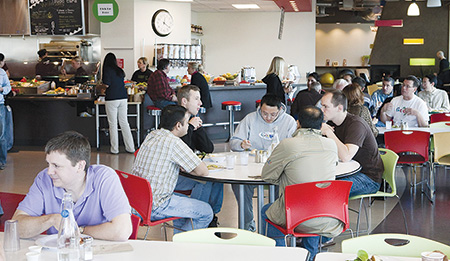Google cafeteria workers vote to unionize
2,300 contracted workers who serve meals to Google employees say they’re overworked and underpaid

San Francisco – Around 2,300 cafeteria workers who work at dozens of Google campuses in the Bay Area, including the search giant’s main headquarters in Mountain View, have unionized.
The workers — who include dishwashers and food preparers who serve breakfast, lunch, and dinner for Google employees — voted last month to join UNITE HERE, which represents some 300,000 workers in the hotel, food service, laundry, warehouse, and casino gaming industries nationally in North America.
Their organizing has gone largely under the radar even amid other high-profile worker activism at Google in the past year, which has included employee protests about sexual harassment, the company’s work with U.S. immigration agencies, and allegations that the company retaliates against employees for reporting HR issues.
But the cafeteria workers’ unionization is some of the most significant union activity tech industry workers have accomplished — particularly for service workers who operate as part of Google’s vast “shadow workforce” of contractors who largely receive lower pay and fewer benefits compared to the company’s full-time employees.
The workers who voted to unionize earn wages that start at around $35,000 a year, according to a source familiar with the matter. And they say they don’t receive all the same benefits such as retirement plans that are standard for full-time Google employees.
Their move to organize represents a symbolic pushback against the status quo of growing economic inequality in Silicon Valley, where all but the top 10 percent of income earners have seen their wages decline from 1997 to 2017.
Since Google contracts these on-site food service workers via a third party, they are technically employed by the multinational food service firm Compass Group, which staffs many of Google’s cafeterias through its subsidiary, Bon Appétit Management Company. Compass Group and the union are now in the process of negotiating a contract.
“We’re fed up and want change,” a worker involved in the campaign said. “At one of the richest companies in the world, we’re being overworked and underpaid.”
Service workers in the tech industry, particularly in the San Francisco Bay Area, have long seen stagnating wages that haven’t kept up with skyrocketing housing prices. In Silicon Valley, where Google’s campuses are located, the cost-of-living is currently the highest in the entire U.S., around $2,911 a month for an apartment, according to a recent estimate from the Silicon Valley Institute for Regional Studies.
Service and retail workers, along with teachers, fire fighters, law enforcement officers, and other non-tech employees, are finding it increasingly difficult to afford to live in their communities.
The situation has become so dire that an ad hoc RV camp formed outside Google’s headquarters, where some tech employees including Google’s own contractors are living. In June, Google announced it would invest $1 billion in land and building homes to help ease the crisis. Facebook and Apple have also made commitments of around $1 billion and $2.5 billion, respectively, to address California’s housing crisis that many say has been driven in large part by the growth of major tech companies.
(Abridged and reprinted from Vox-Recode.)



Leave a Reply